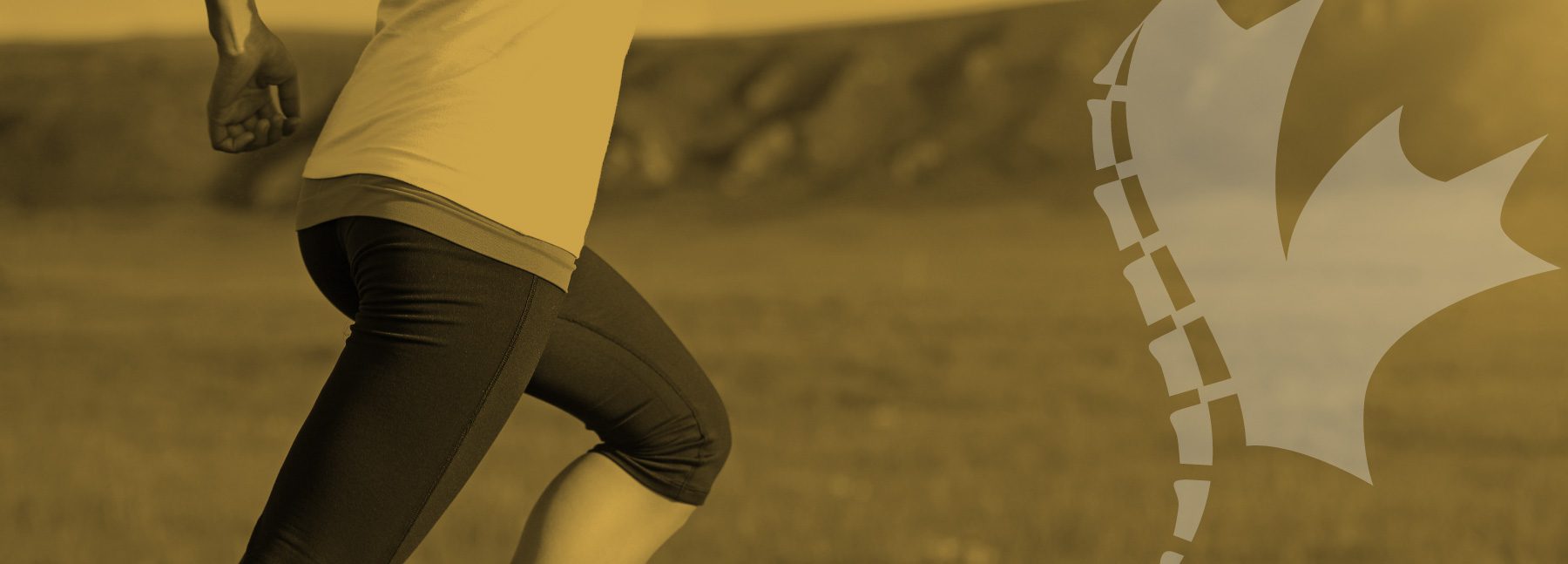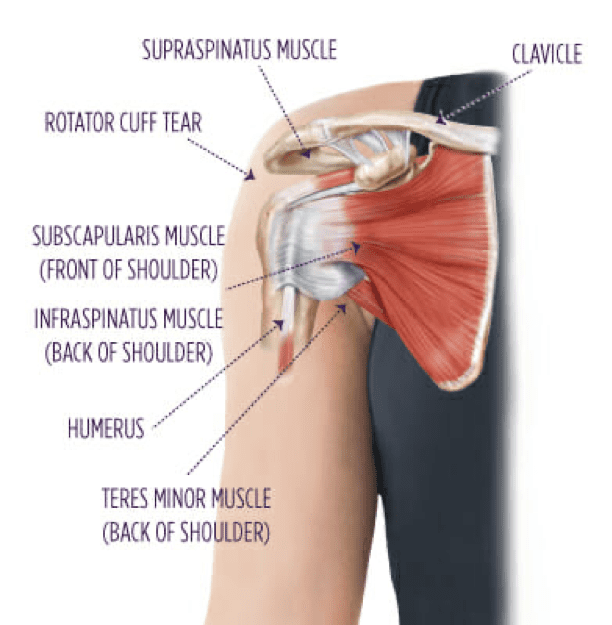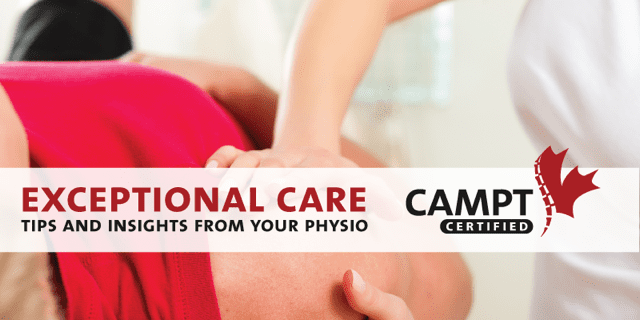Rotator Cuff Injury

The Standard for Exceptional Care
What is the rotator cuff?
The rotator cuff is a group of muscles that surround your shoulder joint to help support and assist with lifting and rotating the shoulder. It is made up of four muscles (supraspinatus, infraspinatus, teres minor and subscapularis) that work together to provide shoulder support and motion. A rotator cuff injury can be very common amongst adults.

How do rotator cuff injuries or tears happen?
The two most common causes of rotator cuff injuries or tears are by an acute injury or a gradual onset by increasing or performing new shoulder activities.
- Acute injury: this typically occurs when a trauma happens, i.e. a fall on the shoulder or on an outstretched arm.
- Gradual onset: this typically occurs when a person increases their shoulder activities, e.g. washing windows or walls during spring cleaning, or tries something new, e.g. pickle ball or tennis. Many people over the age of 40 years old may have normal age-related muscle changes (like wrinkles on the face with aging skin) that present as a rotator cuff tear on ultrasound. This can occur in people naturally and they do not experience any pain or loss of shoulder motion. Occasionally a shoulder can gradually become painful with over-activity and you may be told it is due to a tear.
So, a rotator cuff tear can occur from a fall or be present with normal age-related changes and made worse with unexpected increased shoulder activity.
How can I tell I have a rotator cuff injury?
Some of the typical symptoms of a rotator cuff injury include:
- Painful clicking or popping when lifting your arm overhead
- Pain in the shoulder which can radiate down into the upper arm
- Pain and/or weakness with shoulder movement, especially rotation or putting the hand behind the back
If you experience pain or weakness while reaching and lifting, you should seek medical advice.
Get insights from CAMPT-Certified physiotherapists

Enter your name and email address below to receive additional information about how a CAMPT-Certified physio can help you with this issue and others. We’ll also send you our quarterly newsletter with additional tips to help you get better, recover faster and stay healthier.
By clicking subscribe, you agree that CAMPT can send you the Exceptional Care newsletter and other emails. We will not share your email address with third-parties.
How soon should I seek treatment?
If a person has fallen on their shoulder or outstretched arm and is experiencing pain, they should seek medical advice immediately. Alternatively if someone notices a gradual onset of shoulder pain through increased activity, if they become limited in their ability to do their usual activities, or if they notice new shoulder pain, they should seek the advice of a registered physiotherapist. Recent research supports that the first step should be the services of a physiotherapist to help reduce pain and increase function in the shoulder2.
Is a rotator cuff tear serious?
While it is possible for a rotator cuff injury to resolve over time, it generally only improves with intervention and can get worse without treatment. You could develop persistent shoulder pain and find it very difficult to use the injured arm. The tear can severely restrict function and range of motion. Tears can also increase over time. It’s possible for partial rotator cuff tears to progress to total tears, and a complete tear can make it almost impossible to move your arm.
Why should I see a CAMPT-Certified physiotherapist for a pain/weakness associated with this injury?
If you are told that you have a rotator cuff tear due to gradual onset or acute onset, then seeking the services of a physiotherapist is highly recommended. CAMPT-Certified physiotherapists are advanced trained physiotherapists who are fellows of the Canadian Academy of Manipulative Physiotherapy and have a designation of “FCAMPT” after their name. Due to the depth of their training, they are particularly skilled at treating more complex injuries. Rotator cuff tears, even the ones which develop gradually with age and cause chronic pain, can become pain-free and you will likely be able to move your shoulder more easily by following the advice of an advanced trained physiotherapist.
A CAMPT-Certified therapist will be able to help you better understand the type of rotator cuff injury you have (e.g. acute, degenerative, consequential, inconsequential, etc.), as well as how it may or may not impact your pain, your ability to move safely, how your performance will be affected, and what activities are safe for you to do in your day-to-day life as you recover. They will also be able to discuss prognosis, meaning the amount of time it will take for anticipated changes to occur as you recover.
What are the best nonsurgical treatments for a rotator cuff injury?
There are many effective, nonsurgical treatments for rotator cuff injuries. Your physiotherapist could suggest an arm sling to give your shoulder time to rest and heal or adapting your physical activities for a time. They may also recommend manual therapy treatments to help with mobility and pain control.
Your physiotherapist’s exercises are designed to gradually strengthen and stretch the area so that you can enjoy increased mobility again. If the shoulder pain does not improve with physiotherapy you may be referred to your family doctor for medication, steroid injections or a referral to see an orthopedic surgeon.
Will the injury heal on its own?
Most rotator cuff tears won’t heal on their own unless the injury is minor. The minimum recovery time for a small tear is about two to four weeks, but more severe cases can take several months. With more significant injuries most patients can resume physical activities after 6 months, but the rotator cuff will continue to heal for up to a year.
Can I play sports with a rotator cuff injury?
Going back to previous sports if your rotator cuff isn’t fully recovered will increase your chance of reinjuring the same shoulder. You may also increase the risk for injuries to other parts of your body, for example your hip, elbow or spine. These injuries can be due to overcompensation in support of the affected shoulder. Be aware of activities like golf, repetitive overhead arm movements, push ups, planks. However, if you seek and follow the advice of an advanced trained professional, your shoulder should heal and you should be in a position to return to sports.
References:
- Rotator Cuff anatomy figure was taken from the Summit Orthopedic website (https://www.summitortho.com/services/shoulder/shoulder-related-conditions-treatments/rotator-cuff-injuries/)
- Kuhn JE, Dunn WR, Sanders R, An Q, Baumgarten KM, Bishop JY, et al. Effectiveness of physical therapy in treating atraumatic full-thickness rotator cuff tears: a multicenter prospective cohort study. J Shoulder Elbow Surg. 2013;22(10):1371–9.
